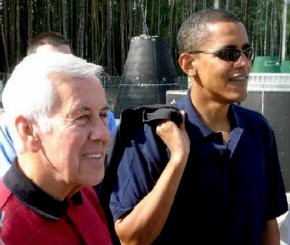Courage to compromise

On a steamy summer afternoon in the 1970s, Richard Lugar came to Hanover College in southern Indiana to speak at a synod meeting about politics as a sacred calling and about how his faith and church membership were an important part of his vocation. Lugar was first elected to the U.S. Senate in 1976 after two terms as mayor of Indianapolis. He had gained national recognition for Unigov, a consolidation of the Indianapolis and Marion County governments that is credited with stimulating Indianapolis’s impressive economic growth.
As a young pastor in northern Indiana, I was deeply impressed, and reminded of John F. Kennedy’s words about the importance and dignity of the political vocation. I was proud of Lugar, a Republican, and of Democratic senator Birch Bayh, both of whom had reputations as moderates who collaborated with senators from the other party.
Read our latest issue or browse back issues.
One of Lugar’s crowning achievements was collaborating with Sam Nunn, a Democrat, to reduce the use, production and stockpiling of nuclear, chemical and biological weapons. Today the Nunn-Lugar Cooperative Threat Reduction Program has deactivated more than 7,500 nuclear warheads. Lugar also cooperated with then senator Joe Biden on complex Pakistani issues and traveled to Russia with then senator Barack Obama.
I was sorry when Lugar lost his recent primary race to state treasurer Richard Mourdock. The race wasn’t even close. Lugar’s age was a factor, as were questions about his residency. But the major reason for his defeat was that the Tea Party and conservative Super PACs such as Freedom Works and Club for Growth poured cash into the Mourdock campaign for the express purpose of replacing Lugar’s brand of moderate bipartisanship with more ideologically orthodox conservatism.
Lugar wrote a letter afterward, affirming his continuing loyalty to the Republican Party and his commitment to working for Mourdock’s election. Then he offered some advice. Mourdock had attacked Lugar’s brand of Republicanism, saying that “it’s time for confrontation, not collaboration.” Lugar wrote that Mourdock will have to revise his unrelenting partisanship if he is to be an effective senator. The effort to cleanse the party of any who deviate from conservative orthodoxy will only magnify the seriousness of the issues facing the nation. “There is little likelihood that either party will be able to impose their favored budget solutions on the other without some degree of compromise.”
Then Lugar revealed his deepest convictions: “Legislators should have an ideological grounding and strong beliefs. . . . But ideology cannot be a substitute for a determination to think for yourself, a willingness to study an issue objectively, and for the fortitude to sometimes disagree with your party or even your constituents.”
Lugar symbolizes something great but fragile about the American system of government: it relies on partisanship tempered by wisdom, on a commitment to the good of the nation that is not wedded to ideology. It is the genius of our system that people with deeply held and opposing ideas can clash yet still find ways to collaborate.
JFK’s Profiles in Courage, written in 1955, influenced me deeply. It is about a handful of Americans who, at critical moments, made decisions that departed from their parties’ ideologies, confounded their own supporters and ultimately cost them dearly. It discusses John Quincy Adams, who was removed from his Senate seat for supporting an embargo on British goods that hurt his New England merchant constituents. JFK also notes the case of Robert Taft, the staunchly conservative Republican senator from Ohio who publicly opposed the Nuremberg Trials after World War II. “The trial of the vanquished by the victor cannot be impartial no matter how it is hedged about with the forms of justice,” Taft warned. Almost nobody agreed with Taft after the horrors of the Nazi era; his position may have cost him his party’s presidential nomination in 1948.
Kennedy named it courage, the willingness to do and say what one thinks is the right thing regardless of consequences. Lugar had it.







